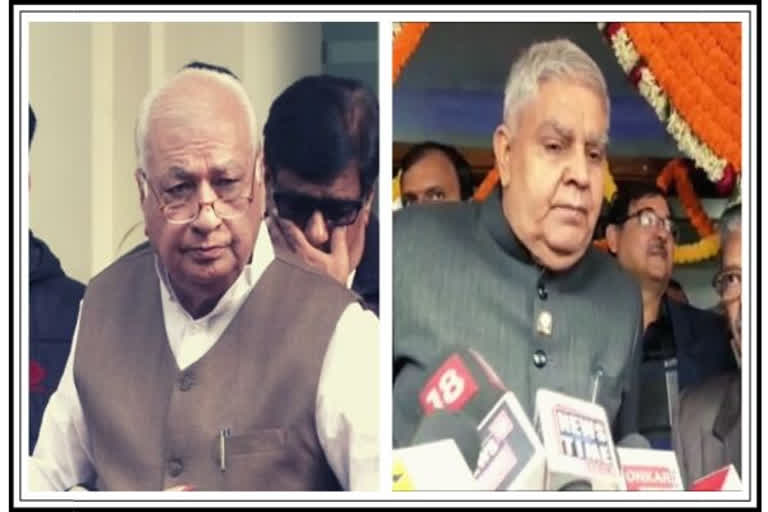Hyderabad: The First Schedule of our Constitution announces that India would thrive as a Union of States. The founders of the Constitution thought that parliamentary democracy would prosper on the foundations of the well-structured democratic federation.
But today’s reality is different. People were shocked at the temerity of Delhi Lieutenant Governor’s statement “I am the government”. Recently, controversies around the Governors of West Bengal and Kerala are clouding in and paving way for the cracks in the federal structure.
The attitude of Kerala’s Governor Arif Mohammed Khan in presuming that it is his responsibility to support the laws formulated by the centre is very astonishing. He asserts that he is not a rubber stamp. His instructions to the LDF government to submit a report on resorting to Supreme Court on the Citizens Amendment Act is a proof of heated politics in Kerala.
On the other hand, Governor of West Bengal Jagdeep Dhankhar has become the epicenter for controversies and severe criticism. He, who openly criticizes the decisions of Mamata Banerjee, was faced with protest placards “BJP worker Dhankhar, Go Back!” in Jadavpur University.
The responsibilities of governors other than constitutional ones, are limited and nominal. It is only when a constitutional crisis arises, Governor comes forth and performs his assigned duty. The incidents of Governors becoming focal points of controversies in Kerala and West Bengal are glaring examples for their transgressing. The concerted response of non-BJP political parties in these two states is a reflection of democracy lovers.
“Political leaders want more power for personal gain. But it is educationists or experts in other fields, who fully cooperate with the government.” These were the comments and the analysis of Pandit Nehru made in Constitution Assembly on the persons to be appointed in Raj Bhavans.
However tall the ideals of those days were, over decades of central rule in the centre, the Congress rule has belittled the position of Governors, who are the first citizens of respective states, to resort to unethical politics.
Earlier, the Supreme Court had lambasted the role of Buta Singh in the abolition of the Bihar Assembly and the attitude of Union Cabinet. Of course, there have been eminent people who brought reverence to the gubernatorial position, such as Jakir Hussain, Sarojini Naidu, Surjit Singh Barnala.
As compared with their numbers, the number of notorious politicians such as Ram Lal, Sibtey Razi , Bhandari, is more. UPA has mastered the art of appointing Governors as Union Ministers and making the ministers don the role of Governors. Even NDA is exhibiting ‘talent’ in fomenting troubles to non-BJP governments through Raj Bhavans.
The political embroilments in Kerala, and West Bengal are glaring examples. Arif Khan, the Governor of Kerala, who withheld the ordinance on enhancing the number of members in local bodies, is accusing Kerala government in the issue of CAB amendment. (Their letter to Union Government without consulting the Governor.) With volleys of queries, Governor Jagdeep is testing the patience of West Bengal’s government. Is this the way that a Governor, who has to liaise the Union and State governments without belittling the constitutional position of a Governor, should function?
All parties have to be equally blamed for politicalizing Raj Bhavans thereby belittling the prestigious institution. In UP, Ramesh Bhandari is very eager to uproot BJP government. Whereas in Bihar, Sunder Singh Bhandari has totally flouted all ethics to strangle, BJP’s opponent Laloo’s government. It’s an open secret that earlier, Satyapal Malik, as Governor of Jammu and Kashmir, was the spirit behind in abolishing J & K assembly, thereby uniting BJP opponents – PDF, National Conference, Congress.
In 1994, the Supreme Court, while delivering the landmark judgement (SR Bommai vs Union Government) while striking down the action of the Union Government in Karnataka turmoil, asserted that Governors should perform their duty above party’s loyalty and act impartially. It also discussed at length the provisions of Article 356 of the Constitution and related issues.
Earlier Sarkaria Commission, as part of its extensive study, made detailed recommendations as to how the functioning of Governors should be. It pointed out that the biased functioning of the Governors, who have been functioning according to their party loyalties, is leading to political turmoil. The recommendations of the commission were kept in cold storage. Because of such a lackadaisical attitude, the very foundations of the spirit of the country’s Constitution are shaking. Nine years ago, while quashing the appointment of Mr PJ Thomas as 14th Chief Vigilance Commissioner, the Supreme Court directed that a person who has befitting moral principles for the position should be appointed.
It is only when the Governors, who should act as functional bridges between the Centre and the State governments, are appointed unambiguously defining their powers and responsibilities and then selecting righteous persons after thoroughly overhauling the policies, the eclipse that is plaguing Raj Bhavans would be rid of.
ALSO READ: Former ministers Jaitley, Sushma, and Fernandes honoured with Padma Vibhushan, Parrikar with Padma Bhushan


